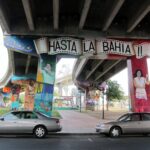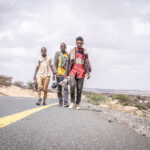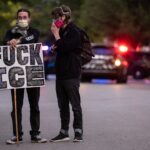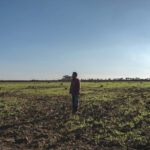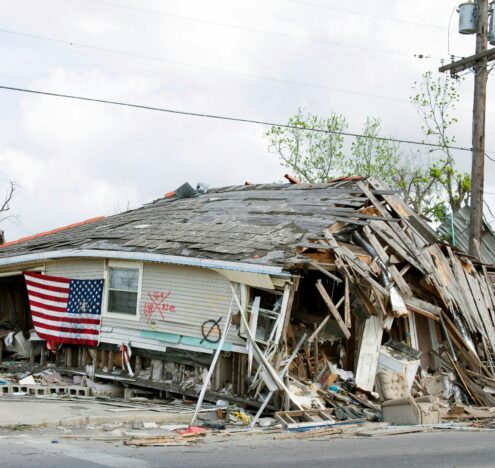On a beautiful spring day in Gaza, Adli and Mansour are in need of a new pair of shoes. Their economic backgrounds are quite divergent, but they have been close since their schooldays. They pull up on their shared motorcycle outside a local shoe shop and make their way inside on their crutches. Both are excited to try on the latest styles and quickly settle on a pair they both love. They split the cost. Adli pays for the left shoe, which is all he needs, and Mansour pays for the right.
They love that they have the same taste in shoes and the same-sized feet, and they laugh and joke with the shop owner, who has never before seen two customers come in to buy a single pair of shoes.
They tell him about a chilly afternoon when Adli noticed Mansour’s shoe looked worn out. He offered to give Mansour his other sneaker, since he didn’t need it, and they had lost opposite legs in successive Israeli attacks. Mansour was hesitant, but Adli assured him they had the same shoe size and that the shoe would be comfortable and supportive. After trying on the shoe, Mansour realized it was indeed very comfortable, and he accepted Adli’s kind offer. They’ve been sharing shoes ever since.
*
I later meet them at a falafel shop, and as they wait for their food, Adli shares his story of fearlessly acting as a first responder during an Israeli attack, only to become a victim himself in a second strike. He was brought into the hospital in a coma, and a medical crew pronounced him dead. His broken body was transferred to the morgue.
Adli looks disturbed as he recalls what he was told of these events. Mansour sits silently, listening to his friend tell the story. Adli’s father arrived at the morgue to say a final farewell to his son only to feel Adli’s hand and realize it was warm; his son was still alive. His screams of joy echoed through the hospital as he embraced his son. Miraculously, Adli regained consciousness in the morgue and was returned to the hospital.
The doctors were astonished. Adli needed several operations in various Gulf states to fully recover, with Mansour by his side. Little did Mansour know that he, too, would lose a leg just a few months later.
Mansour’s younger brother witnessed the bombing that maimed Mansour but did not know his own brother was among the victims. He ran back to his house, breathless and shaking, saying, “Someone has been killed!”
His mother’s face turned pale and she whispered a solemn prayer for the victim’s family, wishing them patience during this difficult time. Hours later, she learned that the victim was her own son, who had lost a leg and some fingers and had shrapnel in his head.
*
After recalling such sad memories, the two men eat their falafel sandwiches — Adli’s favorite — in pensive silence. “The only positive thing about being injured has been how it’s strengthened my friendship with Adli,” says Mansour. “We share everything and split expenses — after all, we are one soul with two bodies.”
“My other leg is over there,” Adli jokes, pointing to Mansour.
Mansour laughs and responds, “Yes, and that’s my other leg, and I can’t even think of going anywhere without it, or without Adli.”
Adli grins. “Together, we are better than before we were injured.”
Mansour nods, his eyes lively.
They enjoy spending time together, whether it’s shopping, eating, relaxing, strolling along the beach, running errands, or riding their one motorcycle. Living in Shujaiya, in East Gaza City, a region heavily impacted by war, the two men like to walk together from the far eastern border to the seafront in the far west, passing through Gaza’s fishing hub.
*
Despite their physical challenges, the friends continue to do their daily activities together, taking pleasure in the simple joys of life. Both men get on their motorcycle and head back home, laughing once again and sharing stories that never seem to come to an end.
In this town, people with disabilities are supported and understood in ways often hard to come by elsewhere. They don’t have to fight for access, inclusion, or representation because everyone has sympathy for people whose bodies have been dismembered by Israel’s military hardware, and because the situation is so common. Disability has been normalized.
In this town, people with disabilities are supported and understood in ways often hard to come by elsewhere.
When Adli and Mansour sit on the seafront to chat for hours, people stop and greet them as they watch the rhythmic motion of the waves in the ocean. They find joy in daily life and inspire others in the community to do the same.
*
Years later I catch up with the two men as we walk under a sycamore tree on Al-Mintar Hill, an area near their homes that overlooks Gaza City. Despite the city’s changes, it still retains a serene beauty, and Gazans try not to let an atmosphere of defeat take hold. In Shujaiya, people’s mode of resilience is to stay, stand firm, and try to enjoy life as best they can despite the odds stacked against them.
Mansour is now married to a wonderful woman named Neda. To his great joy, they are expecting a baby, and his wife is thrilled to have found a job selling homemade sweets online. She’s also happy her husband has the support he needs through his friend Adli.
“We are able to find joy by sharing all we have and continuing to care for one another even through pain,” says Mansour.
As for the motorcycle: Mansour handles the gears and Adli steers. Everyone who sees them fly by on the street is amazed by their degree of cooperation. “When we share a ride, I feel like a whole human body with nothing missing,” Mansour says with a lighthearted laugh as they head toward home with the sunset behind them.
This is a lightly edited extract of Mohammed Omer Almoghayer’s On the Pleasures of Living in Gaza, out on May 6, 2025 with OR Books.






